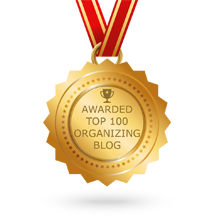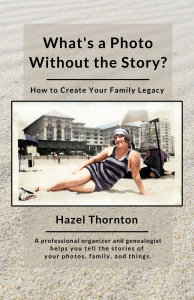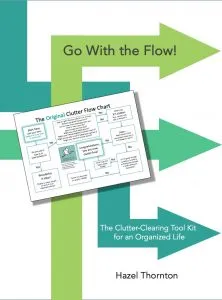Organizing to De-Stress a Major or Chronic Illness
Illness is stressful. The less you have to worry about, the more you can focus your energy on getting well. And getting organized will help you worry less.
This concept applies to any prolonged medical condition that results in decreased energy and mobility.
Here are some examples:
- recovery from a planned surgery
- an unplanned medical or health event
- a major illness
- a chronic condition
- depression
If you are not expecting to fully recover, getting organized will help you to enjoy your “new normal” to its fullest.
The less you have to worry about, the more you can focus your energy on getting well. Click To Tweet
This article started out as a workshop for the New Mexico Cancer Center. I have left the still-viable NM- and cancer-related links intact for those who need them, but most of the resources listed are nation-wide and not illness-specific. The information was intended for individual patients and survivors, but the image of interlocked hands made me realize it would be equally helpful to caregivers.
I update this article every couple of years anyway, but was prompted to do so this time by a brand new podcast episode I just listened to and want to share with you. It features three professional organizing colleagues of mine (host Brooks Duncan, and guests Jennifer Lava and James Lott are all NAPO members): How To Be Productive Through Illness and Recovery. Not everyone needs to be productive during an illness, but…..well, OK, I’m thinking of myself now. I’ve been having issues with my feet/ankles/legs/knees that are taking longer to resolve than I care to admit. Considering how long it’s been now, and how much I’m still not sure what the future holds, I guess you could call it chronic. Ugh. Sadly, I know more than a few friends and colleagues who still need to be productive to some degree while living with a chronic illness. So, I’ve got all of us us in mind. And you.
Here are some parts of your life that will be helpful to organize, with links to resources and related Org4life blog posts.
Organize Your Medical Records
You will need a way to keep all of your medical records together, and organized, so you can find what you are looking for. You will want to take pertinent records with you to medical appointments (information that is currently needed or asked for repeatedly), but you don’t want to have to lug everything with you each time you go. Here are some suggestions:
- Create a control binder. Get a 3-ring binder, hole punch, tabs, business card holder pages, and a plastic pouch for pens. Create sections for symptoms, contacts, medical history, appointments, treatment plan, billing (paid & pending), general info about illness, doctors, chaplain, resources, medications past & present. Add inspiring cover art.
- If you are tech savvy you may prefer to scan documents, keep notes on your smart phone, and use an app like Evernote.
- Use an accordion file or file cabinet for overflow paperwork (items you don’t need to take to appointments, but can’t toss yet either), depending on how much you have, or think you will accumulate. (How to Create Your Own Simple Filing System)
- Order a free Livestrong Guidebook (Planner + Journal) from the Livestrong Foundation.
- LIPA (Legal, Insurance, and Paperwork Assistance) is a program provided by the Cancer Services of New Mexico, along with a free 13-pocket Cancer Treatment Organizer.
Organize Your Support System
People with support systems are healthier and recover more easily from illness than those without them. Not everyone has a support system (a network of family, friends, neighbors, loved ones, and professionals), but if you do, this is the time to take advantage of it! It can be uncomfortable to ask for help, but there are many free online tools available to make it easier for everyone involved. And more paid services than ever before that make it possible for house-bound people to be independent.
- Ask a trusted friend or relative to be your spokesperson (a strong, objective person to speak on your behalf). This person can accompany you to medical appointments and keep others with a need to know apprised of your condition.
- You, or your spokesperson, can use online tools such as Lotsa Helping Hands, Care Calendar, and/or Meal Train to let friends know what you need help with and when. Add Caring Bridge to the list too now!
- Caring Bridge is a free web service that connects people experiencing a health challenge with their family and friends. It allows you (or your spokesperson) to provide medical updates once without having to explain everything over and over again to each individual person who cares about you, which can be exhausting. Some people hesitate to use Caring Bridge because they think it’s just for people who are dying. It’s not true! I promise! And it now includes fund-raising and task calendar tools.
- Both Caring Bridge and GoFundMe will help you collect money, if needed.
- If you are somewhat self-sufficient, but not in a position to drive or walk around in a store, there are now lots of food related delivery services available in most locations. They range from groceries (Instacart) and meal kits (Hello Fresh, Blue Apron), to prepared meals (Freshly) and local restaurant meals (Grubhub). For help with menu planning, take a look at Saving Dinner and The Six O’Clock Scramble.
- Also new in the last few years are transportation apps such as Uber and Lyft. I wouldn’t use them if I were under the influence of heavy medication, or if I needed a lot of help in and out of a car, but otherwise they are popular transportation options that you can use independently.
- Additional Resources: Manage Your Chronic Disease (MyCD) Program; New Mexico Cancer Center; Stand Up to Cancer
Organize Your Home
A clutter-free home is much easier to maintain, and is less stressful to be confined to, than a cluttered one. The more clutter-free and organized your living space is, and the more simplified your systems are, the easier it will be for you to physically get around the house and to keep your household functioning smoothly. Here are some key areas and options for you to consider:
- You may need to declutter your whole house, or you might just need a maintenance plan that you can perform yourself in 15 minutes a day to keep on top of things. If you need help, ask a friend or click here to find a NAPO organizer near you. (How to Create More S.P.A.C.E. in Your Life)
- For free daily email reminders and encouragement, check out Fly Lady.
- Manage incoming mail and paper using an Action File. (Mystery Piles and Action Files)
- Housekeeping can be included in your own daily routine, or provided by your support system. You might even qualify for the Cleaning For a Reason program, which provides free house cleaning for cancer patients. Please be aware that this program might be available in your area, and you may indeed qualify, but your local program might also be overloaded with requests. It’s worth asking, though. (How clean does your house really need to be?)
- Mail order is your friend when you can’t leave the house. If you can buy local, great, but if that’s just too hard, Amazon or delivery from your favorite chain store can be a lifesaver.
- Simplify your household systems. Do you really need lots of decorative pillows on your bed? Sure it looks nice, but consider the effort it takes to make your bed each day. Do you need to sort your laundry into so many different categories? How about just lights and darks, at least for now? How else can you simplify? (Six Organizing Systems Everyone Needs)
- Family planning and scheduling aids include Cozi (free family calendar, shopping, grocery and to do lists, family journal, etc.), and Google Calendar, which allows calendar sharing.
- Keep medications and medical supplies organized, handy, easy to use, and visible so you know what you’ve got on hand, what you need to take, and what you’ve already taken. Make use of daily & weekly pill dispensers and other similar aids. And arrange to have your prescriptions delivered.
Organize Your Self
It takes a positive mindset to overcome a severe, lengthy, or chronic illness. Do whatever you can to free yourself of mental clutter, and reserve your strength for building up your health and positive energy. Here are some ideas:
- Don’t try to remember everything! And don’t make yourself have to get up and find a pen and paper every time you want to write something down. Keep a little notebook handy in your pocket (or hung around your neck) to jot down reminders of calls you need to make, grocery list items, questions for doctors, etc.
- Create and use checklists to make your morning routine, evening routine, and doctor visits easier. Keep them in your control binder.
- Give yourself a break! This is not the time to be beating yourself up for all the things you are not doing. You don’t feel well, and you’re tired all the time. What you should be doing is recuperating!
- Give yourself permission not to do so much by literally making a list of “back-burner” activities. These are projects you will do, or resume doing, in the future…that is, if you still want to when your energy returns.
- Surround yourself with positive people, thoughts, books, films, and images. You don’t have the time and energy for negativity. A colleague with cancer has a Pinterest board where she pins positive images and quotes that she finds for herself. If you don’t have Netflix (or similar streaming video service), this might be a good time to get it.
- Facebook and other social media sites can help you stay in touch with friends at your leisure, and help you feel less isolated, especially when you aren’t up to receiving visitors. Consider using this more for entertainment and social interaction rather than for serious medical updates unless you want to be repeating yourself frequently and be reminded of your illness every time you log on.
- Remember to be grateful. Gratitude can be a huge happiness booster and stress reliever! Start a gratitude journal. Google it; there are apps for that these days!
I hope this list will help you or someone you know. I am always on the lookout for ways to improve it.
One more thing: This looks to be a terrific e-book from esteemed NAPO colleague Dorothy Breininger. I’ve only glanced through it because I didn’t want to read it too closely and then feel like my article is inadequate. LOL? It’s called The Cancer Concierge, and it’s downloadable for free. Plus, she probably said things in a different way than I did. Whatever helps, right? (Those Magic Little Words (that help you get organized))
If you, or someone you know, is chronically ill, or recovering from an illness, injury, or surgery, and you have new ideas for me (or if there’s a broken link I haven’t noticed), I’m all ears! Please join the conversation by leaving a comment.
And here’s to better health for all!
—————————————————————————
Copyright 2011-2019 by Hazel Thornton, Organized for Life.
Social media links directly to this page are encouraged!
Please contact me for other types of reprint permission.
—————————————————————————
Share this:









This is a fantastic compilation of resources! It can be so hard for patients and their family members to find the supports they need, but you’ve done a great job of finding what’s available and organizing the information.
Thanks, Janet! I’m looking forward to seeing your Personal Medical Organizer. Might need to include it when I update my resource list, which I do annually.
That would be wonderful!
I agree–you’ve done an amazing job of collecting all those resources. I especially appreciate you mentioning the “don’t beat yourself up” piece. Even when feeling a little off, it’s easy to do that for those of us A-types.
Thanks for a new resource. I will use it.
Thanks, Moreen, I’m glad it’s something you can use!
Great resource Hazel. Thanks for pulling all of them together in one place. You are great at that.
Thanks, Elizabeth!
[…] This post was inspired by Albuquerque professional organizer Hazel Thornton’s blog article Organizing to De-Stress a Major Illness. With her permission I have put my own spin on her original content, which can be viewed here. […]
Here is the link to Margit Novack’s article, based on my article: http://www.movingsolutions.com/2013/11/14/organizing-face-illness/
[…] This post was inspired by Albuquerque professional organizer Hazel Thornton’s blog article Organizing to De-Stress a Major Illness. With her permission I have put my own spin on her original content, which can be viewed here. […]
Hazel, I love the idea of “back-burner” activities. It can apply to those recovering from an illness or anyone feeling the overwhelmed by all of their commitments. Great post.
Thanks, Jamie! Yes, it can apply to anyone. I have a few things on my own back-burner list!
My Mom has had many surgeries (poor thing!) She finally loaded her entire surgery history into a document and takes it with her whenever she sees a doctor, because there is always a question about what surgeries you have had. I think anyone with a complex history should have a copy of all procedures, and if it applies, a list of all allergic reactions, in a document. We think we can rely on the doctor to have our records, but often we move around from one specialist to another. This weekend I will be helping her recover from knee replacement surgery – a big one! I wish I could wave a magic wand so she could avoid these procedures, but since I can’t, I’m bringing food and support.
When my dad was living, I helped my mom create a medical binder so that she had all of his pertinent information at her fingertips. I’ve also helped many clients do that along with setting up detailed medical files (when needed.)
As my mom’s health care proxy and overseer of her care, I created a one-page reference document that lists all her medications (doses, reasons for taking, etc..), a brief medical history, and important numbers, doctors, insurance policies, and more. It’s helpful to have when we visit doctors or the times she’s ended up in the emergency room.
The resources and ideas you’ve compiled are fantastic! The most challenging part is getting these things in place when you’re not feeling well. That’s when it’s a good time to reach out to others to help solidify systems and organization. You provide an excellent template for doing so.
I didn’t realize how important it was to have a medicine list until my father was living with me before he died. It’s so important when you have several doctors you visit in a month who most like do not speak with one another.
Thanks for the link to the book for people who are struggling with cancer.
Great resource and good reminders. Another very helpful article, Hazel. And…hope your legs get better!
Thanks, Candice!
Hazel, this is not only a superb compilation of resources, but this is the beginning of a valuable ebook. (Hint, hint.)
Hmmmm….thanks, Julie! I am considering any and all topics I’ve written about as candidates for ebooks! Especially now that I know (thru KDP) I can update them at will.
Wow! You have covered just about everything, Hazel!! Such a great list of resources. Right now my personal medical needs are rather easy to track. But I helped my mother create folders for each doctor & that certainly helped. We just dumped all the benefit statements in one bin by year!! One extra health folder I have is for blood donations. I try to give 3-4 times a year & they always give a summary page at each visit. Thanks again for the info!!
I used Caring Bridge to keep family and friends informed when my husband was hospitalized for 23 days in 2018. Sometimes it was all I could do to post a daily update and I was thankful not to have to answer or write multiple emails!
Thanks for the endorsement of Caring Bridge, Janet! I think some people hesitate to use it because they think (wrongly) that it’s only for people who are dying.